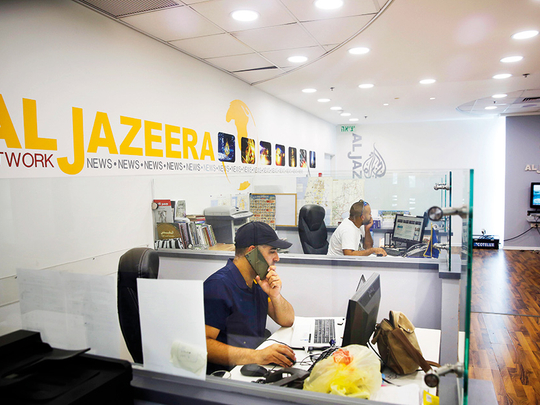
Manama: A Bahraini minister said that Qatar’s information and media policies were part of the problem, and not of the solution to the current crisis that had been simmering long before diplomatic and trade ties were severed on June 5.
“Those who believe that the crisis with Qatar started when the anti-terrorism countries decided to boycott Qatar are wrong,” Ali Al Romaihi, the Minister of Information Affairs, said. “The background to the crisis with Qatar is its media policies that have, since the launch of Al Jazeera TV channel, disdained the depth of our relationships.”
Al Romaihi told Bahrain Television on Monday evening that he deplored that the crisis was being addressed in the media and in a manner that was alien to the Gulf societies.
“The situation is being underrated at a time when there is a need to rise to the seriousness of the decisions and to assess the gravity of the conditions.”
Reviewing Qatar’s media policy towards Bahrain, the minister said that it was characterised by the harm it wanted to inflict on the kingdom.
“When Bahrain expressed its displeasure with the hosting of outlaws on Al Jazeera, Qatar resorted to manipulating designations and distorting facts, claiming that Al Jazeera was an independent channel that hosted opposition figures.”
The minister added that the Gulf countries had been largely forgiving with the string of grave errors made by Qatar through Al Jazeera.
“Qatari nationals have nothing to do with the policies pursued by Al Jazeera against Gulf countries. In fact, Qataris were in many ways embarrassed by the broadcasting of a channel that represented the state, but not the people, especially when it encroached on living and dead iconic figures,” Al Romaihi said.
“The facts are clear: More than 20 years after Al Jazeera was launched as a large media investment and training centre, the Qataris have benefitted very little from it. The number of Qataris employed by the channel is only five per cent, and most of them are kept off the limelight and do not appear on screen. Qataris have complained that Al Jazeera does not represent them and is not concerned with their issues. The channel would for instance film and broadcast a rally of a few people in a distant country and present it as a newsworthy issue whereas when 13 children died from asphyxiation in a mall in Qatar, there was no real coverage of the tragedy.”
Al Romaihi added that the channel was now reaching the point of “media bankruptcy.”
“We are now witnessing how after the real objectives of Al Jazeera’s policy have come out in the open, it is broadcasting programmes that do not fit even neophytes addressing a crisis with ominous consequences,” he said.
“Those who believe that the issue is beyond its own control are wrong. The channel has reached a point where it can no longer face the reality on the ground. Al Jazeera feeds itself on crises and the continuation of the current crisis means the continuation of Al Jazeera while its end spells the end of Al Jazeera.”
Al Romaihi pointed out that Bahrain had been a prime target for Al Jazeera and that the kingdom had to face the highest number of challenges.
“Al Jazeera relies on the virtual world with its wide spectrum of fake and bogus accounts for its statistics and public opinion surveys. The channel has broadcast more than 900 negative reports and news items on Bahrain. The Qataris who were pained when accusations were levelled at their country should imagine the extent of the suffering of Bahrain when charges and allegations were made by Al Jazeera for 20 years and on a daily basis, when specific figures are purposefully selected to appear on the channel to attack Bahrain and ruin its reputation. When contacted about the situation, Qatar responded by claiming that its allegations were based on social media accounts. Thus, Qatar compared the size and potential of Al Jazeera with fictitious accounts with little or no credibility.”
Al Romaihi added that Al Jazeera was also targeting other Gulf countries, mainly Saudi Arabia and the United Arab Emirates, and Arab states.












